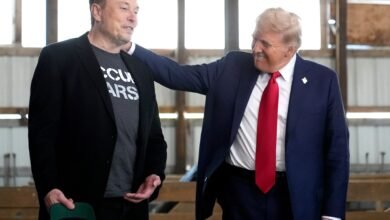Canada should pursue bilateral trade agreements with U.S. and Mexico, says Alberta premier

Alberta Premier Danielle Smith says Canada should be looking at bilateral trade agreements with the U.S. and with Mexico as all three countries prepare to review and potentially renegotiate the Canada-United States-Mexico Agreement in 2026.
“I think there’s always been an imbalance between these three partners,” Smith said on Rosemary Barton Live, which aired on Sunday. “Canada and the U.S. have always had more balanced trade.”
According to the United States Census Bureau, Canada had a trade surplus with the U.S. of about $64 billion US in 2023. That means the U.S. bought more of Canada’s goods than Canada imported from south of the border.
In comparison, Mexico had a trade surplus with the U.S. of about $152.5 billion in 2023.
Smith said that one thing Canada needs to understand about the incoming Trump administration is that “they really want us to buy as much stuff from them as they buy from us,” and if there’s a trade imbalance, it will “identify that those are problematic areas.”
Rosemary Barton speaks with Alberta Premier Danielle Smith about why she agrees with Ontario Premier Doug Ford’s pitch to explore dropping Mexico from the trilateral North American trade deal if it doesn’t tighten restrictions on Chinese goods. She also discussed the province’s plan to work with the Trump administration and Alberta joining a pact with a dozen states to promote energy security.
The Alberta premier also criticized Mexico over “their increasing invitation to the Chinese to invest [in the country].”
Washington is concerned about Chinese-owned car plants popping up in Mexico. Chinese electric vehicle maker BYD has been scouting locations in Mexico for a factory that could supply the U.S. market.
“The question is: Why would we support continuing in a trilateral agreement if it’s going to be imbalanced that way?” Smith told host Rosemary Barton. “We really should be looking at two bilateral agreements.”
The United States “can have its own agreement with Mexico,” she said. “I think we would end up with very constructive outcomes that way.”

Smith’s comments come days after Ontario Premier Doug Ford pitched that Canada explore a bilateral pact with the U.S. He also criticized Mexico, saying the country has become a “backdoor for Chinese cars” and should match Canadian and American tariffs on Chinese imports.
The current trilateral pact, known in Canada as CUSMA, must be reviewed in 2026. U.S. president-elect Donald Trump promised on the campaign trail to renegotiate the agreement.
On Saturday, Prime Minister Justin Trudeau said Mexico was a “solid partner” during the last round of trade negotiations and acknowledged concerns over Chinese investment in Mexico.
“Standing up for Canadian jobs, Canadian opportunities is the fundamental job of a Canadian prime minister, and that’s what we’re going to continue to do,” Trudeau said. “But I’m hopeful that we’re going to be able to do it within the context of trilateral negotiations.”
Steelmaker CEO not concerned about tariffs
Looming over the trade discussions is Trump’s vow to impose a minimum tariff of 10 per cent on all imports entering the U.S. Sources have told CBC News that Trump’s allies haven’t offered assurances of a reprieve for Canada.
Lourenco Goncalves, president and CEO of U.S.-based Cleveland-Cliffs Inc., which recently acquired Hamilton-based steelmaker Stelco Holdings Inc., said on Rosemary Barton Live that the tariffs are “not a concern” for him.
“But it is something that we will continue to work on, because I don’t believe that [Trump] will put tariffs just for tariffs’ sake,” he said.
“I absolutely have the full conviction that the relationship between Canada and the United States is way beyond any temporary situation, any disturbance that may or may not occur in trade.”
Chief political correspondent Rosemary Barton speaks with Lourenco Goncalves, CEO of Cleveland-Cliffs, about the American steelmaker acquiring Stelco, his recent meeting with Deputy Prime Minister Chrystia Freeland and the threat of tariffs from the incoming Trump administration.
Goncalves said he believes that the “co-dependency” between Canada and the U.S. will “enhance during the Trump administration.”
As for Mexico, he said that Trump and his former trade representative, Robert Lighthizer, who is reportedly going to play a role in the new administration, “prefer” bilateral agreements instead of multilateral agreements.
He also said that a Canada-U.S. bilateral trade agreement could serve as a “model” for future agreements the United States decides to pursue with other countries.
Smith said that a global tariff like the one Trump has pitched would be “devastating” for Canada and that if the federal government can take a bilateral approach and “avoid tariffs altogether, I think that should be the goal.”
Source link




